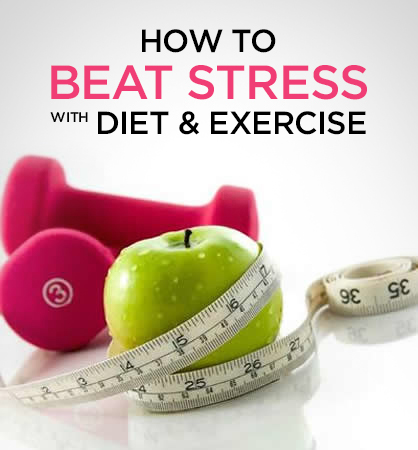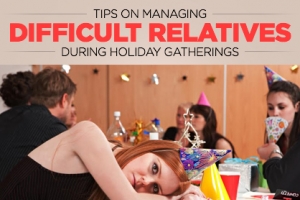Diet and Exercise Your Way to No Stress
We all know the benefits of good nutrition and exercise. But here’s one you may not have considered: It lowers stress. A healthy diet and regular workouts can help you effectively deal with the hustle and bustle of everyday life, and protect you from stress-related disorders.
A physical and emotional reaction to changes in your life, stress, although a normal sensation, can exacerbate a great variety of health problems. The symptoms of stress can be difficult to recognize at times. Stress affects you physically, mentality and emotionally. Signs you are suffering from too much stress include headaches, muscle tension, fatigue, sleep problems, anxiety, depression, outbursts of anger and social withdrawal. When left to its own devices, stress can contribute to high blood pressure, heart disease, obesity and diabetes, among other serious disorders.
“Stress comes in many forms: psychological, physical, biological, environmental and physiological. Any attack by the environment on any of these systems can wreak havoc on your immune system, your lymphatic system, your adrenal and thyroid glands, not to mention your blood pressure,” Erin J Morgart, Health and Fitness Expert, advised.
According to Morgart, when stress comes knocking, hit the pavement and find some physical activity plus feed your bod a healthy diet. Try these techniques as part of your stress-management program.
Exercise
The benefits of exercise are numerous, and as they add up – reduced blood pressure, increased endorphins, higher self-esteem and increased oxygen consumption – so too does the impact on your stress level. To optimize your decrease in stress, it is important to elevate your pulse to your target heart rate. Morgart recommends something to really get your juices going, such as running, spinning, kickboxing, rowing and high-intensity training.
“Here are the down-and-dirty guidelines, exercise-phobes,” Morgart outlined. “In the past, some random person stated that one could get away with a paltry twenty minute workout per day and get fantastic results. This beautiful idea was naturally gravitated towards by many who were looking for the quick fix and the extremely easy way out. Americans need to wake up!”
Her suggested program is not for the faint of heart. Try in the neighborhood of six days a week, an hour per session, as set forth by the American College of Sports Medicine. Be sure to keep your heart rate at a minimum of 65 percent of your target heart rate (one formula is 220 - your age x .65 or .85 = your Maximal Heart Rate). Morgart advises purchasing a heart rate monitor to ensure ideal results.
If you are having difficulty getting motivated, be aware that exercise can cause greater concentration, healthier relationships, lowered cholesterol and an improved sex life.
Diet
Yes, when you are under stress, it is okay sometimes to head to the refrigerator. The best items to consume for stress relief include omega 3s, flaxseed oil, liquid chlorophyll and vitamin C. Many supplements can help, especially complex B vitamins, spirulina, carnitine and vitamin D.
“The most optimal diet to eliminate stress is one which is low-glycemic, which involves high-fiber, low-starch foods; most leafy green vegetables and low-glycemic fruits; very little bread, pasta and rice; very little alcohol; and lean protein, which would include salmon, flounder, turkey (highest source of protein), tofu and lentils,” Morgart said.
Try to consume a great deal of raw foods, which keep you lean, ensure you get the enzymes you need out of your food and can keep your body alkaline and less acidic.
“Food, or raw food in particular, can increase stamina, increase your sexual life and performance, reduce the need for processed food and excess starch, make your skin clear, and can balance the pH of the body. All of these factors alone will ultimately help you overcome stress as your body morphs into a new shape,” Morgart explained.
At the End of the Day
Stress is harmful on the body. If stress becomes persistent, even if at a low level, it can trigger the body’s stress-management apparatus, causing it to become chronically overactivated. Over time, chronic stress can result in physical or psychological trauma.
The majority of Americans will experience significant stress at least once a year. Stress hits not just you, but the people around you, putting your relationships at risk.
“increased levels of stress over time have been known to produce disrupted levels of serotonin (needed to maintain feelings of well-being), often causing people to then resort to anti-depressants or serotonin-uptake inhibitors. As well, the adrenal-pituitary-hypothalamic system is further disrupted by stress, often increasing those with compulsive behaviors such as perfectionism to escalate,” Morgart said.
Be sure to talk to your health care provider, who can help you set realistic goals and achieve optimal results as you start a new plan of diet and exercise. If you take measures to control your stress and your symptoms continue, consult a physician, who can check for other causes. For other natural ways to beat stress, try LadyLUX’s article on 7 Easy Techniques to Eliminate Stress.
Tagged in: exercise, health, diet, stress management, stress, stress relief, erin morgart,

LadyLUX



